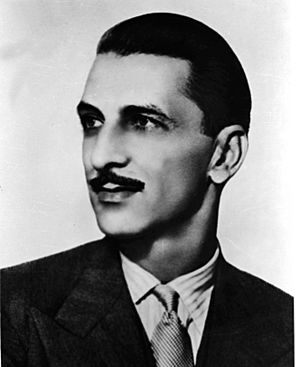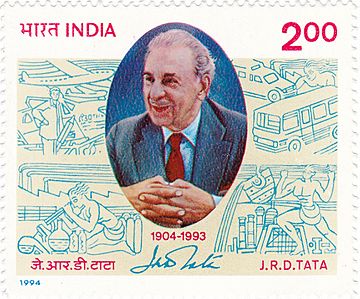J. R. D. Tata facts for kids
Quick facts for kids
J. R. D. Tata
|
|
|---|---|

Tata in 1955
|
|
| Born | 29 July 1904 Paris, France
|
| Died | 29 November 1993 (aged 89) Geneva, Switzerland
|
| Citizenship | France (1904–1928) India (1929–1993) |
| Occupation | Businessman |
| Known for | Founder of Tata Consultancy Services, Tata Motors, Titan Industries, Voltas and Air India |
| Spouse(s) | Thelma Tata |
| Parent(s) | Ratanji Dadabhoy Tata Suzanne "Sooni" Brière |
| Relatives | See Tata family |
| Awards | Bharat Ratna |
Jehangir Ratanji Dadabhoy Tata (1904–1993), known as J. R. D. Tata, was a famous Indian businessman and pilot. He led the huge Tata Group of companies for many years.
He was born into the well-known Tata family. His mother was the first woman in India to drive a car. J. R. D. himself became India's first licensed pilot in 1929. He is famous for starting many important companies under the Tata Group. These include Tata Consultancy Services, Tata Motors, Titan Industries, Tata Salt, Voltas, and Air India.
J. R. D. Tata received many honors for his work. In 1983, France gave him the Legion of Honour. India gave him two of its highest civilian awards: the Padma Vibhushan in 1955 and the Bharat Ratna in 1992.
Contents
Early Life and Education
J. R. D. Tata was born in Paris, France, on July 29, 1904. His full name was Jehangir. He was the second child of businessman Ratanji Dadabhoy Tata and his French wife, Suzanne "Sooni" Brière. His father was a cousin of Jamsetji Tata, who was a pioneer in Indian industry.
Because his mother was French, J. R. D. spent much of his childhood in France. French was his first language. He went to school in Paris, London, Japan, and India. When his father joined the Tata company, the family moved to London.
After his mother passed away, his father decided to bring the family back to India. J. R. D. went to England for more studies in 1923. He wanted to study engineering at Cambridge University. However, as a French citizen, he had to join the army for at least a year.
He joined the French Army and was assigned as a secretary because he could read, write, and type in both French and English. After his time in the army, his father called him back to India. He then joined the Tata Company. In 1929, Tata gave up his French citizenship and became an Indian citizen.
A Pioneer in Aviation
J. R. D. Tata was inspired by Louis Blériot, a famous aviation pioneer. Blériot was the first person to fly across the English Channel. This inspiration led J. R. D. to learn how to fly.
On February 10, 1929, J. R. D. Tata received the first pilot's license ever given in India. He later became known as the "Father of Indian civil aviation". In 1932, he founded India's first commercial airline, Tata Airlines. This airline later became Air India in 1946, which is now India's national airline.
J. R. D. and his friend Nevill Vintcent worked together to build Tata Airlines. In 1932, Tata Aviation Service, the first version of Air India, began flying. That same year, J. R. D. flew the first commercial mail flight to Juhu. He piloted a de Havilland Puss Moth plane.
The first flight in Indian aviation history took off from Drigh in Karachi. It flew to Madras on October 15, 1932. J. R. D. was at the controls of the Puss Moth. He carefully guided his airline until 1953. At that time, the Indian government decided to take over Air India. J. R. D. strongly disagreed with this decision.
Leading the Tata Group
J. R. D. Tata joined Tata Sons as an unpaid trainee in 1925. In 1938, when he was just 34 years old, he became the Chairman of Tata Sons. This made him the head of the largest industrial group in India. He took over from his cousin, Nowroji Saklatwala.
For many decades, he led the huge Tata Group of companies. These companies had major interests in steel, engineering, power, chemicals, and hotels. He was known for being successful in business while always being honest. He refused to bribe politicians or use illegal methods.
Under his leadership, the value of the Tata Group grew from $100 million to over $5 billion. When he started, the group had 14 companies. Fifty years later, in 1988, when he retired, the Tata Group had 95 companies. These were companies they either started or controlled.
He was also a trustee of the Sir Dorabji Tata Trust for over 50 years. This Trust helped start Asia's first cancer hospital. It was the Tata Memorial Centre for Cancer, Research and Treatment in Bombay, opened in 1941. He also founded other important institutions. These include the Tata Institute of Social Sciences (TISS) in 1936. He also started the Tata Institute of Fundamental Research (TIFR) in 1945. And he founded the National Center for Performing Arts.
In 1945, he founded Tata Motors, a major car company. In 1948, Tata launched Air India International. This was India's first international airline. In 1953, the Indian Government made Tata the Chairman of Air India. He also became a director on the Board of Indian Airlines. He held these positions for 25 years. For his great achievements in aviation, he was given the title of Honorary Air Commodore of India.
J. R. D. Tata cared deeply about his workers. In 1956, he started a program to give workers a stronger voice in company decisions. He strongly believed in helping employees. He supported ideas like an eight-hour workday, free medical help, and retirement savings plans for workers. These ideas later became laws in India.
In 1968, he founded Tata Consultancy Services, which started as Tata Computer Centre. In 1979, Tata Steel started a new rule. A worker was considered "at work" from the moment they left home until they returned. This meant the company was responsible if anything happened to them on their way to or from work. In 1987, he founded Titan Industries, a company known for watches and jewelry.
Awards and Honors
J. R. D. Tata received many awards and honors throughout his life. The Indian Air Force gave him the honorary rank of group captain in 1948. He was later promoted to Air Commodore in 1966. In 1974, he was further promoted to Air Vice Marshal.
He also received several international awards for his work in aviation. These include the Tony Jannus Award in 1979. He also received the Gold Air Medal in 1985 and the Edward Warner Award in 1986. In 1988, he was given the Daniel Guggenheim Medal.
As mentioned before, he received the Padma Vibhushan in 1955. The French Legion of Honour was given to him in 1983. In 1992, he received India's highest civilian honor, the Bharat Ratna. This was for his selfless efforts to help people. In the same year, he also received the United Nations Population Award. This was for his work in starting family planning programs in India.
In his memory, the government of Maharashtra named a bridge after him. It is called the Bharatratna JRD Tata Overbridge in Pimpri Chinchwad.
Death and Legacy
J. R. D. Tata passed away in Geneva, Switzerland, on November 29, 1993. He was 89 years old and died from a kidney infection. A few days before he died, he said in French, "Comme c'est doux de mourir" which means "How gentle it is to die."
When he passed away, the Parliament of India stopped its work in his memory. This is a special honor usually given only to members of parliament. He was buried in the Père Lachaise Cemetery in Paris.
In 2012, J. R. D. Tata was ranked the sixth "The Greatest Indian" in a poll. This poll was conducted by Outlook magazine along with CNN-IBN and History18 Channels.
See also
- The Greatest Indian
- R. M. Lala
- Jamsetji Tata
- Ratanji Dadabhoy Tata
- Rattanbai Petit
- Dorabji Tata


